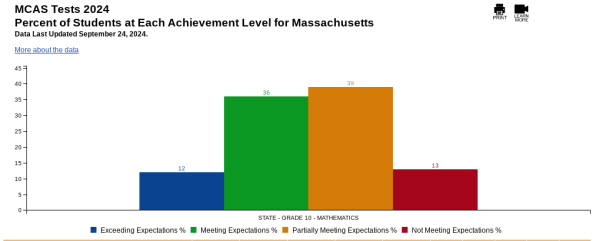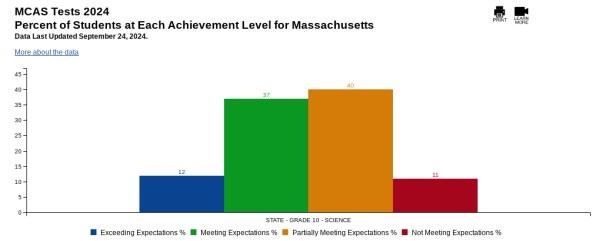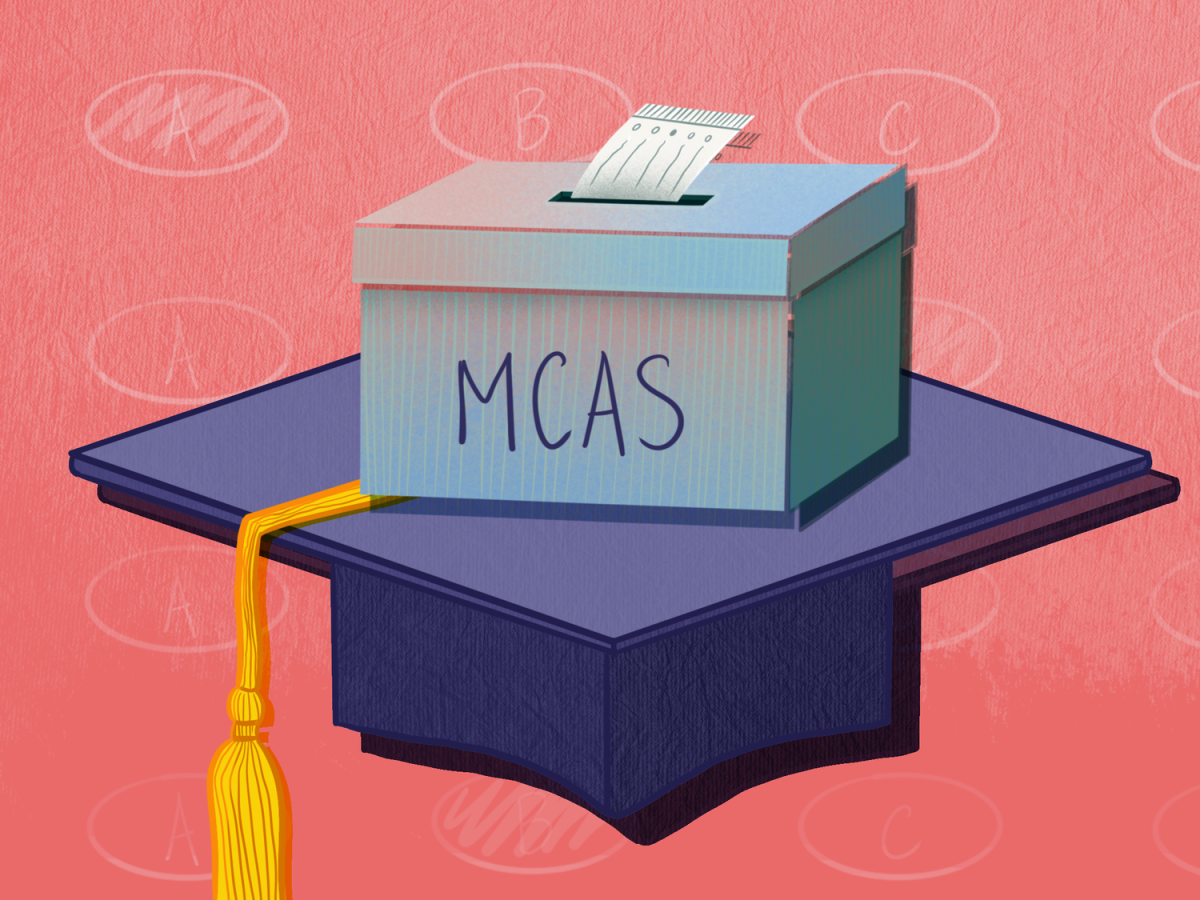This 2024 election, Massachusetts voters were encouraged to vote for figures they believe will represent them. However, they were also faced with five ballot questions. One of these is Question 2 which could drastically impact the education system. Question 2 is the Repeal Competency Assessment Requirement for High School Graduation Initiative, more commonly referred to as the removal of MCAS as a graduation requirement for high school.
A ‘yes’ vote would support the removal of the requirement that students must reach a passing score on the exam to graduate high school. The voter turnout was 59% in favor of the removal in the November 5th election.
A ‘no’ vote would keep the current system and passing MCAS will continue to be a graduation requirement, which resulted in a 41% voter turnout against the removal. Due to this primarily impacting those within the education system, interviews were conducted within nearby public schools to find out student and educator opinions and to understand the arguments surrounding the question.
The main argument presented by those who oppose the removal is that Massachusetts will no longer be the best-performing school system in the nation. Many claim that there will be no more reliable data to hold students accountable or to gauge the standing of the school. In an interview with SBRHS senior Deanna DeStefano, “I think standardized tests are necessary for schools in gauging where schools are academically and the money schools get from the states as it needs to know what schools to help especially if students are underperforming on state standards.”
The 2024 statistics regarding the current standings for 10th grade were as follows: 39% of students are partially meeting expectations in mathematics; 13% are not meeting standards statewide. 31% of students are partially meeting expectations in English and 12% are not meeting standards. Finally, 40% of students in science are partially meeting expectations with 11% not meeting standards. [Massachusetts Department of Education].



Many supporters of the removal justify their stance by explaining how education had become too reliant on test taking. Within Daniel Kortez’s [Harvard Educational Policy Researcher] The Testing Charade: Pretending to Make Schools Better, Kortez wrote, “It shapes what is taught and how it is taught. It influences the problems students are given in math class, the materials they are given to read, the essays and other work they are required to produce.”
During an interview with SBRHS student Katherine Miller, she made the claim “Massachusetts is #1 in the country in education currently for a reason; we need to keep these standards to hold students accountable.” This claim that Massachusetts has the best education is backed by Mass. Press Secretary Karissa Hand (2024) who stated, “The state ranks first for the quality of its school systems, with the fourth best high school graduation rate at over 90 percent.”
A major issue often cited by opposers of the requirement is how it leaves children with learning disabilities (especially undiagnosed) behind. For this, a discussion with Isilda Farias [Special education teacher at Joseph Case High School] was held asking about the details of accommodations students are given. “Students with disabilities like dyscalculia are given calculators and reference sheets. It’s still difficult to accommodate students with undiagnosed disabilities, a common one is ADHD for example.” When asked about children with test anxiety, “There are some kids with GAD [Generalized Anxiety Disorder] who really struggle with the test even if they understand the material.”
Students not putting in their best effort in the exam causing false data is a concern as MCAS has been used as a measuring tool to gauge where the gaps are for schools. One major motivation is the John and Abigail Adams Scholarship, which is awarded to top scorers on the MCAS exam. According to the Massachusetts DESE, “The scholarship provides tuition credit for up to 8 semesters of undergraduate education at Massachusetts state college or University.” Jacob Wilson, sophomore at SBRHS argued in response, “people will still try in MCAS because they’ll still want the [John and Abigail Adams] scholarship.”
However, teachers also claim that they are experiencing a lack of care among underperforming students since the recent passage. Isilda Farias said, “I’ve already had some students ask me ‘what’s the point of passing now’ as they said they will just pick random multiple choice answers now instead of putting in the effort.”
The subjects tested on MCAS consist of mathematics, science, and English. However, not every student wishes to go down a career path related to these courses. Chloe Perrotty, an advanced art student at SBRHS said, “It doesn’t impact my goals in art at all.” The sentiment was also shared by Abigail Gloster, another SB art student who said, “It’s just another standardized test, a lot of what I do in school isn’t going to impact that part of my life.” Students who wish to achieve their goals in alternative fields have been against testing as courses are designed to teach topics they don’t wish to pursue.
The opposition to question 2 is the group Protect Our Kids, who state on their website, “Massachusetts has the best K-12 education system in the country, but won’t for long if Question 2 becomes law. In fact, Massachusetts would have less rigorous high school graduation requirements than Mississippi and Alabama. Such a radical and untested proposal should be rejected.”
Massachusetts is now one of only two states in the nation (the other being Vermont) to not have a statewide graduation requirement. Previously, passing the MCAS was the only state requirement of the state Department of Elementary and Secondary Education. The movement to strike down MCAS was achieved by the Massachusetts Teachers Association (MTA).
Following the passage of question 2, MTA released the statement; “Massachusetts voters have proclaimed that they are ready to let teachers teach, and students learn, without the onerous effects of a high-stakes standardized test undermining the mission of public education: prepare all students for future success as citizens, workers and creative, happy adults.”








